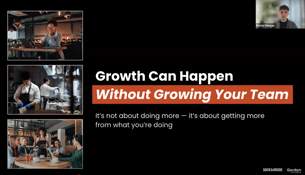Despite the handful of takeout menus that still wind up in your mailbox most weeks, digital marketing channels have become the standard for restaurant operators hoping to build and nurture devoted customer bases. The most-talked about restaurants earned their reputations by driving online conversations. More and more, they’re leveraging tools to refine their messaging, research customer behavior, and ensure they reach the right audiences, on the right channels, at the right time.
With all the day-to-day operational responsibilities on your list, identifying the right digital marketing strategies could wind up neglected. Sometimes, operators hesitate because they don’t know where to start, and we don’t blame them.
Restaurant Marketing Advice from Experts
The world of restaurant marketing can look overwhelming. You’ve got a whole ecosystem of vendors to familiarize yourself with as well as countless new terms and ideas. With clarity, consistency, and a little expert guidance, however, operators can learn the ins and outs of digital marketing without needing to enroll in business school.
To help operators better reach and engage the right customers, we spoke to Eric Brandt, CEO of 5th Gear Marketing and Kyle Golding, CEO of The Golding Group –two executives with plenty of restaurant marketing experience.
Brandt’s organization uses geo-demographic data to target its efforts and tailor campaigns for big-name clients including Subway, Dairy Queen, Starbucks, and Domino’s. Golding employs a test-and-refine approach. He serves an equally impressive portfolio of clients by collecting a wealth of customer feedback and tweaking digital marketing strategies accordingly.
Digital Marketing Strategies for Restaurants
Though their preferred techniques may differ, Brandt and Golding agreed on many points. For the novice digital marketer, the two seasons pros offered these five tried and true restaurant marketing tips.
Claim and verify your business profiles
You can start generating more search traffic for free by establishing your business profile on Google. The profile provides you a central dashboard for managing ads, soliciting feedback, and targeting customers based on their location.
Sites like Yelp offer additional resources. Claiming these profiles, verifying them, and managing their details in the long term improves your visibility and allows you to engage directly with prospects and loyal customers.
Prioritize your ad buys for cost effectiveness
What’s the best channel for paid restaurant marketing? That depends on the restaurant, but Brandt and Golding agreed that operators should experiment with Yelp ads before exploring Google. Though the world’s most popular search engine has plenty to offer, Yelp has lots of specialized features to help you get started. Just make sure to determine how you’ll handle negative reviews. The right approach could turn bad press into renewed relationships with customers who are glad to have given you a second chance.
Once you’ve mastered Yelp, branch out into additional advertising channels. Just make sure your efforts are always tied back to business goals. Golding suggests trying out Nextdoor’s advertising options, which he has found especially cost effective.
Think twice about text campaigns
You’ve got plenty of customer phone numbers and the means for sending promotional texts. Now’s the time for a text-based campaign, right? Not necessarily. Brandt and Golding warn that the drawbacks of this method may outweigh its benefits. Though you’ll reach customers directly, you’ll run the risk of alienating them if they consider the messages obtrusive. That’s not to mention the cost and time commitment of getting text campaigns up and running.
Brandt says that you should only commit to an SMS campaign if you know you’ve got what it takes to track engagement from the start. Operators who are just getting their first taste of digital marketing would do better to conduct outreach via email and social media.
Build and refine your official web presence
If your restaurant isn’t easily discoverable online, it may as well not exist. Hungry customers will settle for a competitor before they commit to thorough research. Whether you decide to leverage a Google business profile alone or build your own site from scratch, you’ll need up-to-date information and professional-quality photographs to keep customers informed and to stand out from the pack. Once you’ve got a website to address common questions and handle reservations, you’ll spend far less time fielding phone calls and more time focused on creating memorable dining experiences.
Don’t forget about social media. From nascent channels like TikTok to standbys like Instagram and Facebook, each one offers unique opportunities to build your brand. Social channels aren’t just useful for attracting first-time diners or advertising new specials. They offer a venue for ongoing conversations and relationship building. You’ll find powerful performance insights and potentially game-changing ideas for restaurant marketing by engaging with your followers and listening in.
Make data collection simple with your POS system
Successful digital marketing strategies for restaurants run on customer data. To excel at restaurant marketing you need to know as much as possible about your customers. This will help you better serve the customers you already have while empowering you to reach unfamiliar audiences.
Thanks to your POS system, you may already have the means for capturing this data and putting it to strategic use. Square, for example, easily collects phone numbers, email addresses, and ordering preferences. These data points could serve as the building blocks for targeted email campaigns that drive additional restaurant traffic.
Additional Restaurant Marketing Tips
- Consistency is key: Though you’ll use a slightly different voice on social media than in emails, you should strive for consistency across your various digital channels. A consistent tone, message, and brand identity helps you build trust with customers by ensuring them of your dependability.
- Take advantage of user-generated content: Loyal customers may feel compelled to do some marketing and advertising on your behalf. Their authentic testimonials will help you bolster your reputation without devoting too much additional time to creating and distributing new content.
- Pick the right metrics: How do you define success? You can’t achieve it unless you know. First, establish your short- and long-term goals. Next, determine how these relate to your marketing initiatives and how you’ll track progress with key performance indicators.
Perhaps the most valuable advice of all is to keep tracking and refining your efforts. Digital marketing strategies for restaurants evolve as quickly as the industry itself. Long-term success requires close monitoring and ongoing work to ensure tools and techniques remain suited to your ideal customers.





